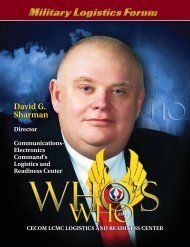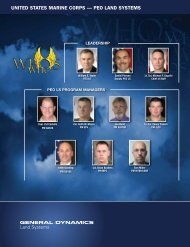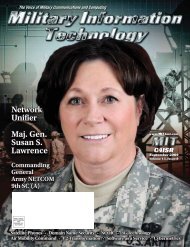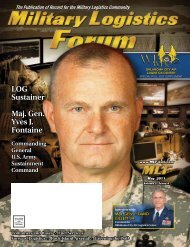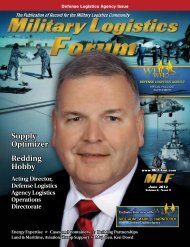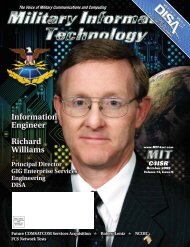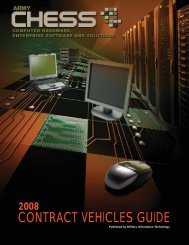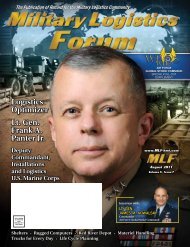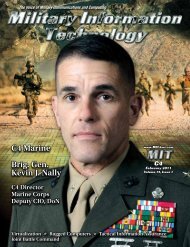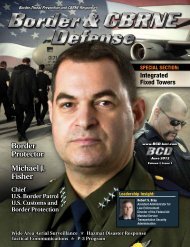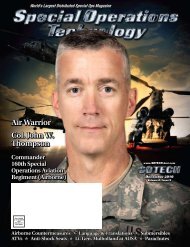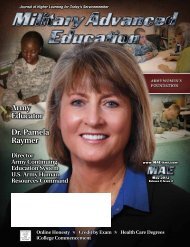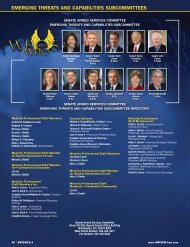Theater Logistician Maj. Gen. Kenneth S. Dowd - KMI Media Group
Theater Logistician Maj. Gen. Kenneth S. Dowd - KMI Media Group
Theater Logistician Maj. Gen. Kenneth S. Dowd - KMI Media Group
You also want an ePaper? Increase the reach of your titles
YUMPU automatically turns print PDFs into web optimized ePapers that Google loves.
we will bring out and what we will leave for the Iraqi security<br />
forces as they build their military.<br />
Another challenge has been transferring resources and<br />
equipment from Iraq, as they become available, over into<br />
Afghanistan. For example Red Horse and Seabees [engineering<br />
units] are necessary to help us build the base camps in<br />
Afghanistan. We have had to time their withdrawal from Iraq<br />
and transfer to Afghanistan to construct the base camps for the<br />
buildup of forces. Those are complex decisions, and complex<br />
movements to execute. We want the incoming units to be able<br />
to get off the plane, hop into their awaiting MRAPs, drive off to<br />
their pre-established protected base camps and be in the fight<br />
within a week or so. We have met this challenge very well.<br />
The third challenge is the ability to repair the gear from<br />
Iraq that is needed in Afghanistan prior to moving it. We<br />
are primarily talking about engineer equipment needed in<br />
Afghanistan in order to finish the building of the facilities in<br />
there. We have had to time that very closely on bringing the<br />
equipment out, repairing it and bringing it forward.<br />
These are our biggest challenges we are facing in balancing<br />
the Iraq drawdown and Afghanistan increase in force<br />
structure.<br />
Q: You mentioned what you might be leaving behind with the<br />
Iraqi forces. Do you have interaction with the Iraqi Logistics<br />
Corps and assist in developing professional capabilities<br />
within their system?<br />
A: The Multi-National Security Transition Command-Iraq<br />
[MNSTC-I] provides the oversight for training. They are a subordinate<br />
command to Multi-National Forces-Iraq, commanded<br />
by <strong>Gen</strong>eral Odierno. What we’ve done is to pull together some<br />
of our national partners like the Defense Logistics Agency, who<br />
have come to our theater and helped the Iraqis develop warehouse<br />
procedures, repair part procedures and an accountability<br />
process for many of the critical assets to keep their gear and<br />
military running. We also have provided logisticians at the tactical<br />
level to assist the Iraqis in developing their logistical systems<br />
from the tactical level to the operational level and on to the<br />
strategic level. We are also using the Army Materiel Command<br />
to help do some of the oversight work on some contracting and<br />
repair of Iraqi gear. It’s about looking at the entire life cycle of<br />
the logistics model within the Iraqi forces. I will tell you that<br />
we have only been at this for about two years, and we still have<br />
a ways to go, but we have worked these initiatives very hard<br />
and are seeing strong results.<br />
Q: As the Northern Distribution Network spools up, what<br />
have been the experiences so far?<br />
A: We realized we needed a Northern Distribution Network<br />
as we were looking at the amount of forces that were going<br />
to flow into Afghanistan. We had one primary route into<br />
Afghanistan, which we call the Pakistan ground line of communications,<br />
or Pak GLOC. We got with our command’s policy<br />
team and our political/military [pol/mil] folks and looked at<br />
other opportunities to bring supplies into Afghanistan. From<br />
there, we developed the Northern Distribution Network [NDN],<br />
with the help of TRANSCOM and DLA, to bring supplies over<br />
a network of various commercial routes which transit, Russia,<br />
the Caucusus, the Central Asian States, and into Afghanistan<br />
through Russia and other points along the route.<br />
We transport only non-lethal cargo through the NDN<br />
—mainly rations, wood and other similar supplies. We are<br />
considering transporting some types of vehicles—again<br />
non-lethal in design. The NDN provides a valuable supplement<br />
to the Pak GLOC. It also allows us to help those countries<br />
that the NDN transits. We try to procure various items<br />
locally such as concrete, barbed wire, water and Coca Cola.<br />
This lessens the transportation burden, while providing local<br />
economic benefit to the countries through which the NDN<br />
transits.<br />
So the NDN benefits us and others in a number of ways.<br />
It was a choice to try and improve the LOCs while helping<br />
the pol/mil teams in their engagement with these other<br />
countries.<br />
Q: Are you looking to establish even more lines of supply into<br />
Afghanistan?<br />
A: We are currently working a route with the State Department<br />
through China, where we might be able to bring things




